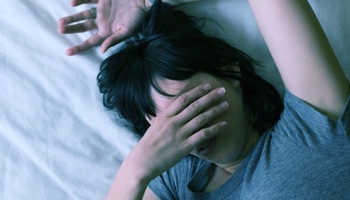Reading Time: 3 minutes
While some people debate whether marijuana is addictive or not, many former users have agreed that marijuana is indeed addictive. And, while it may not be as dangerous as other drugs, such as heroin or cocaine, marijuana still causes changes to the brain and when someone that uses it frequently tries to kick the habit, they may experience withdrawal. One of the most unpleasant being marijuana withdrawal insomnia. During this time it can be very difficult to fall asleep or get proper sleep.
There currently isn’t medicine that is especially for treatment of marijuana addiction, but there is research being conducted and certain medications have been tested that can help suppress the reported withdrawal symptoms of marijuana. According to the National Institute on Drug Abuse, while there are no medications to treat marijuana addiction -a laboratory study showed that the combination of cannabinoid agonist with lofexidine showed improved sleep, and reduced cravings.
Can Treatment Help a User Cope with Marijuana Withdrawal Insomnia?

Exercising, eating right, and talking with a counselor can help you get through marijuana withdrawal.
The symptoms of marijuana withdrawal may vary from one smoker to another. The more addicted a person becomes to smoking marijuana, the more probable that they may experience unpleasant symptoms. From the symptoms that have been reported, insomnia seems to be a big problem. Difficulty falling asleep or getting enough sleep can cause other health problems. Getting treatment may help with insomnia. Some ways treatment can help may include:
- When detoxing from marijuana, there are medications that may be helpful in reducing certain symptoms to allow you to feel more relaxed, and may have a sedating effect which can help you to get sleep. Not all centers may offer this, so it is best to visit one and find out what the options are for helping you cope with insomnia, and other unpleasant symptoms too.
- Counseling can help a person cope with thoughts and feelings of confusion they may be experiencing. Anxiety and restlessness due to overthinking can sometimes cause disturbed sleep patterns too. Rather than returning to use marijuana again to avoid thinking about problems, it is best to find the root cause and learn to deal with issues constructively -than turning to drug use.
- Improving eating habits can help improve sleep patterns. Some users have reported that marijuana makes them hungry for junk food. Diets comprised of mostly these types of food can cause nutritional deficiencies, including sleep interruptions. Treatment centers may offer an individual a meal plan they can follow based on their nutritional needs.
Most of the symptoms of withdrawal from marijuana may subside over a two week period. If insomnia continues to be a problem, a doctor may prescribe medication that can help an individual get the sleep they need. Depending on the treatment center you choose, there may be other options or methods used that can help an individual cope with insomnia.
Getting Help with Marijuana Withdrawal Insomnia and Other Symptoms
If you or a loved one have tried quitting marijuana smoking, only to return to using it again due to withdrawal symptoms, treatment for addiction may help. To learn the options available for treating and coping with marijuana addiction and/or withdrawal – contact an addiction specialist that can provide you with the information you need to successfully stop smoking marijuana.
